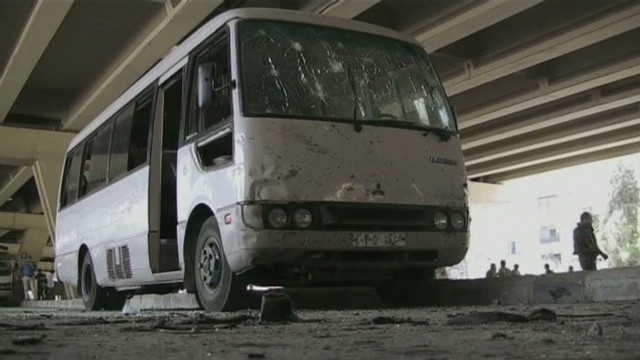
- The clashes reportedly take place in Latakia, where a presidential palace is located
- The attacks Saturday come a day after a bomber hits near mosque in Damascus
- U.S. official: A peace plan agreed to by the Syrian regime "is failing thus far"
Are you there? Send us your images or video. Also, read this report in Arabic.
(CNN) -- Syrian forces clashed with opposition fighters early Saturday in the coastal city of Latakia, anti-government activists said, further crumbling a shaky cease-fire meant to end 13 months of unrest.
The clashes occurred in Burj Islam village, where a presidential palace is located, according to the opposition Syrian Observatory for Human Rights.
The new attacks came a day after a bomber struck near a mosque in the capital of Damascus, killing nine people -- most of them government forces, Syrian state-run media reported. It described the attack in Midan district as a "terrorist bombing."
The observatory put the death toll from the suicide bombing at 10, and reported that most of the victims were regime forces.
In addition to that tally, 18 more people were killed across Syria on Friday, according to the opposition Local Coordination Committees of Syria.
 U.N. response in Syria mocked
U.N. response in Syria mocked 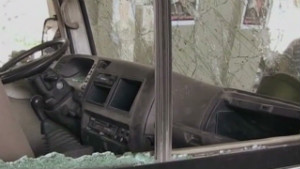 Annan's Syria peace plan may be dead
Annan's Syria peace plan may be dead 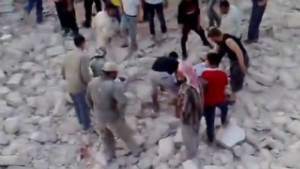 Opposition: Syria attack kills dozens
Opposition: Syria attack kills dozens 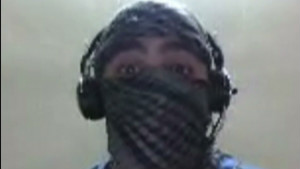 Report: Syrian killings after U.N. visit
Report: Syrian killings after U.N. visit 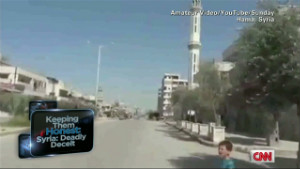 Syria's deadly lies to U.N. monitors
Syria's deadly lies to U.N. monitors 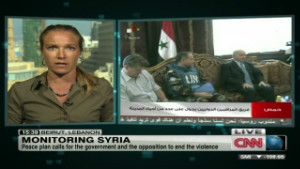 Shelling of Syrian city intensifies
Shelling of Syrian city intensifies During Friday's bombing, riot police and troops had huddled beneath an overpass to confront those emerging from a nearby mosque to protest against the government, ITN reporter Bill Neely said. Such demonstrations are common after prayers.
A man walked up to the security forces. When he was asked for his identification, he reached into his jacket and detonated a suicide vest, said Neely, one of the few Western journalists allowed by the government to report from Syria.
The attack represented yet another blow to a peace plan that has been undermined by both sides of the conflict.
U.S. State Department spokeswoman Victoria Nuland said the six-point peace plan brokered by international envoy Kofi Annan has failed.
"Well, obviously, we can all see that it is the Assad regime that is failing to meet its obligations under the six-point plan," Nuland said. "And as a result, the plan as a whole is failing thus far."
The international community said Syria has not withdrawn its troops and heavy weapons from population centers, as the government agreed to do as part of the peace plan.
The plan includes calls for President Bashar al-Assad's government and the opposition to end the bloodshed, allow humanitarian groups access to the population, release detainees and start a political dialogue.
As the peace plan unravels, the United Nations is working to get more monitors into the nation.
As of Friday, 13 were in the country of 22 million people. An additional 15 are scheduled to arrive this weekend, and a total of 300 are slated to arrive in the coming month. The United States is not providing monitors, but is helping with funding and logistics.
Syrian activists have accused the United Nations of failing to move quickly to get its peace monitors into the country, but Nuland said preparations take time.
"You can't just take Joe Schmo off the street," she said. "You have to take somebody who has experience and training in monitoring, understands U.N. standards, understands their obligations in terms of human rights."
The United Nations has to negotiate and sign contracts with governments sending personnel, which in some cases require parliamentary approval, Nuland said. Then there's the physical transport of the personnel.
While there have been ample volunteers for the monitoring mission, Nuland said, the Syrian government is trying to choose among certain nationalities.
Syria has been engulfed in violence since March 2011, when the government started started cracking down on demonstrators who were peacefully protesting al-Assad's regime. The president's family has ruled Syria for 42 years.
Some opposition members have since taken up arms against the regime forces.
The United Nations estimates at least 9,000 people have died in the conflict, while opposition activist groups put the death toll at more than 11,000.
CNN cannot independently verify reports of violence and deaths within Syria, as the government has restricted access by most of the international media.
CNN's Jill Dougherty contributed to this report.



